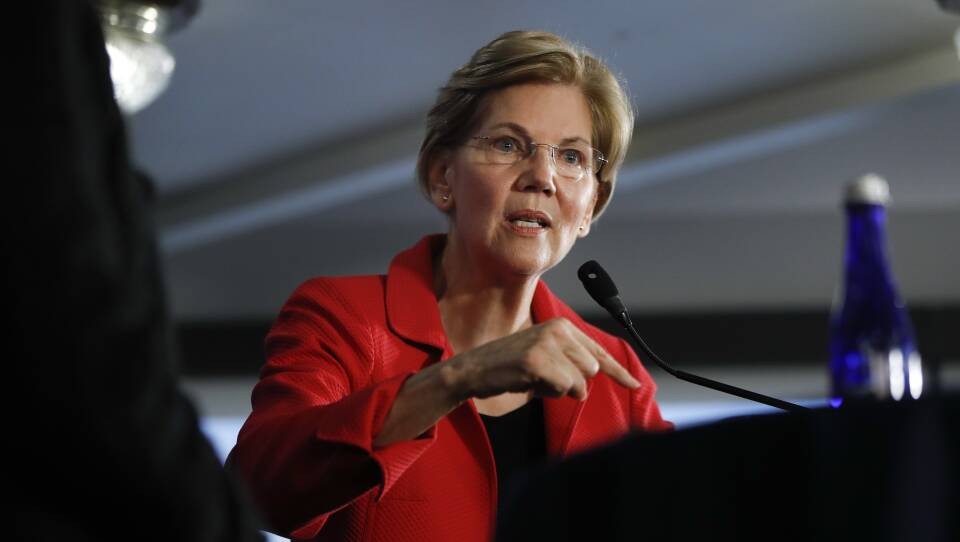Senator Elizabeth Warren has unveiled a bill aimed at cracking down on government corruption. The measure is called the Anti-Corruption and Public Integrity Act. Warren spoke with WGBH's All Things Considered host Barbara Howard. The following transcript has been edited for clarity.
Howard: You say that doing away with Citizens United is just not enough. That's the Supreme Court decision, still on the books, that unleashed lavish political contributions. Your bill has several provisions. Here are two in a nutshell: one that places a lifetime ban on lobbying after serving as president, vice-president, as a cabinet secretary, or in Congress. And another ban's top government officials from holding individual stocks while serving. They would instead be able to make conflict-free investments. You say that the way things are, there is unfair access to legislators. Is that right?
Senator Elizabeth Warren: Yeah, that's exactly right. Both of those are designed to make sure that when someone is in Washington working in the public interest, that it's really the public interest they have in mind and not their next fancy job working for a lobbying firm or the stock that they hold in their portfolio. If you want to come work for the public, then you've really got to work for the public.
Howard: What kind of oversight would there be for those who might break the rules that you're proposing?
Warren: I propose that we have a new independent sheriff to police corruption. So this bill has a lot in it about disclosures that everybody would be required to make. If you want to hold these jobs, you've got to be willing to show the public what you've got. And that means we'd have someone heading up this agency just to make sure everyone really has disclosed what they're supposed to disclose and if necessary, investigating. And it requires that once you leave Congress, you have to continue to make disclosures. Once you leave as a cabinet head, or once you leave as president of the United States, you've got to continue to make disclosures.
Howard: Another provision of your bill requires presidential candidates to disclose eight years of tax returns. That seems squarely aimed at President Trump, who of course has not released his tax returns.
Warren: Trump gives an example of why you need to do this. I'll tell you exactly why: right now, when the Saudis go to the Trump Hotel and take an entire floor of rooms, are they funneling money directly into Donald Trump's pocket? We don't know, because he didn't get rid of his conflicts - that is, running a business on the side. And we don't know because he doesn't release his tax returns. We don't know where his money's coming from. But it's not just Donald Trump. This really is about Democrats and Republicans. This is about people who are in the House and the Senate.
Howard: It seems like there's little chance that this bill will make it through the Republican-controlled Congress, and even less chance that it will be signed by President Trump. So why push it now?
Warren: Because people understand that we have a problem in Washington. Step one is you've got to call it out for what it is: corruption. There's too much power in the hands of the rich and the well-connected here in Washington. Number two is you've got to show there are ways we could fix this. Yes, it's a big bill, because the problem itself is big. And three, you've got to start. This should be Democrats, Republicans, independents. Nobody should like the fact that corporate lobbyists are making contributions to elected officials. Nobody should like the fact that people are making decisions in government and trading on their own stock portfolios and getting rich off it.
Howard: Of course political pundits are going to view this bill as something that you can point to as an achievement, or at least part of a platform, should you decide to run for president in 2020. And of course I must ask you the perennial question: will you be running for president in 2020?
Warren: I am up for Senate in 77 days in the Commonwealth of Massachusetts. I have been all across the state multiple times, and I'm glad to do it.
Howard: But I must ask again: will you run for president in 2020?
Warren: I am running for Senate in 2018, and one of the things I'm doing is trying to stay focused on the fights in front of us right now
Howard: Thanks for joining us, Senator Warren.
Warren: You bet.
Howard: That's Senator Elizabeth Warren, talking about a new bill she's proposing called the Anti-Corruption and Public Integrity Act. This is WGBH's All Things Considered.




